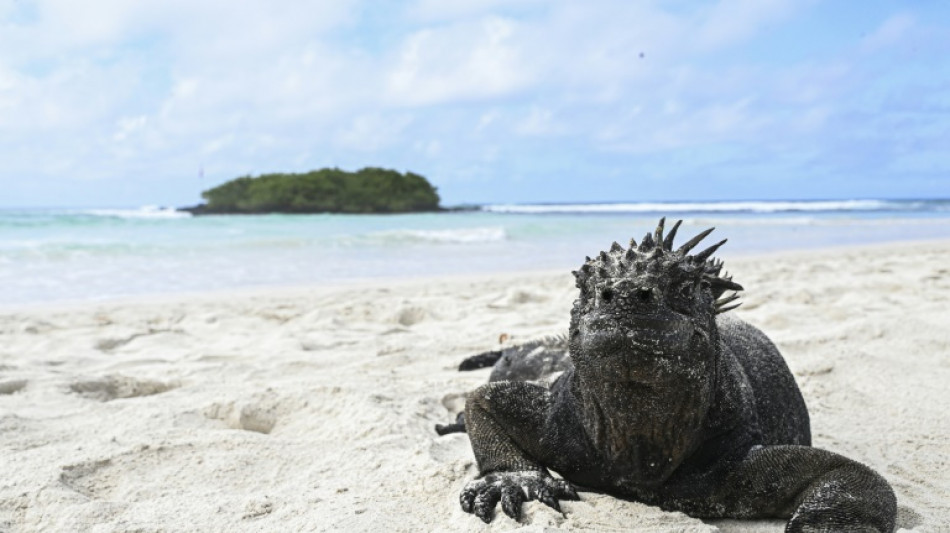
-
 Argentina govt launches account to debunk 'lies' about Milei
Argentina govt launches account to debunk 'lies' about Milei
-
Australia drug kingpin walks free after police informant scandal

-
 Dupont wants more after France sparkle and then wobble against Ireland
Dupont wants more after France sparkle and then wobble against Ireland
-
Cuba says willing to talk to US, 'without pressure'

-
 NFL names 49ers to face Rams in Aussie regular-season debut
NFL names 49ers to face Rams in Aussie regular-season debut
-
Bielle-Biarrey sparkles as rampant France beat Ireland in Six Nations

-
 Flame arrives in Milan for Winter Olympics ceremony
Flame arrives in Milan for Winter Olympics ceremony
-
Olympic big air champion Su survives scare

-
 89 kidnapped Nigerian Christians released
89 kidnapped Nigerian Christians released
-
Cuba willing to talk to US, 'without pressure'

-
 Famine spreading in Sudan's Darfur, UN-backed experts warn
Famine spreading in Sudan's Darfur, UN-backed experts warn
-
2026 Winter Olympics flame arrives in Milan

-
 Congo-Brazzaville's veteran president declares re-election run
Congo-Brazzaville's veteran president declares re-election run
-
Olympic snowboard star Chloe Kim proud to represent 'diverse' USA

-
 Iran filmmaker Panahi fears Iranians' interests will be 'sacrificed' in US talks
Iran filmmaker Panahi fears Iranians' interests will be 'sacrificed' in US talks
-
Leicester at risk of relegation after six-point deduction

-
 Deadly storm sparks floods in Spain, raises calls to postpone Portugal vote
Deadly storm sparks floods in Spain, raises calls to postpone Portugal vote
-
Trump urges new nuclear treaty after Russia agreement ends

-
 'Burned in their houses': Nigerians recount horror of massacre
'Burned in their houses': Nigerians recount horror of massacre
-
Carney scraps Canada EV sales mandate, affirms auto sector's future is electric

-
 Emotional reunions, dashed hopes as Ukraine soldiers released
Emotional reunions, dashed hopes as Ukraine soldiers released
-
Bad Bunny promises to bring Puerto Rican culture to Super Bowl

-
 Venezuela amnesty bill excludes gross rights abuses under Chavez, Maduro
Venezuela amnesty bill excludes gross rights abuses under Chavez, Maduro
-
Lower pollution during Covid boosted methane: study

-
 Doping chiefs vow to look into Olympic ski jumping 'penis injection' claims
Doping chiefs vow to look into Olympic ski jumping 'penis injection' claims
-
England's Feyi-Waboso in injury scare ahead of Six Nations opener

-
 EU defends Spain after Telegram founder criticism
EU defends Spain after Telegram founder criticism
-
Novo Nordisk vows legal action to protect Wegovy pill

-
 Swiss rivalry is fun -- until Games start, says Odermatt
Swiss rivalry is fun -- until Games start, says Odermatt
-
Canadian snowboarder McMorris eyes slopestyle after crash at Olympics

-
 Deadly storm sparks floods in Spain, disrupts Portugal vote
Deadly storm sparks floods in Spain, disrupts Portugal vote
-
Ukrainian flag bearer proud to show his country is still standing

-
 Carney scraps Canada EV sales mandate
Carney scraps Canada EV sales mandate
-
Morocco says evacuated 140,000 people due to severe weather

-
 Spurs boss Frank says Romero outburst 'dealt with internally'
Spurs boss Frank says Romero outburst 'dealt with internally'
-
Giannis suitors make deals as NBA trade deadline nears

-
 Carrick stresses significance of Munich air disaster to Man Utd history
Carrick stresses significance of Munich air disaster to Man Utd history
-
Record January window for transfers despite drop in spending

-
 'Burned inside their houses': Nigerians recount horror of massacre
'Burned inside their houses': Nigerians recount horror of massacre
-
Iran, US prepare for Oman talks after deadly protest crackdown

-
 Winter Olympics opening ceremony nears as virus disrupts ice hockey
Winter Olympics opening ceremony nears as virus disrupts ice hockey
-
Mining giant Rio Tinto abandons Glencore merger bid

-
 Davos forum opens probe into CEO Brende's Epstein links
Davos forum opens probe into CEO Brende's Epstein links
-
ECB warns of stronger euro impact, holds rates

-
 Famine spreading in Sudan's Darfur, warn UN-backed experts
Famine spreading in Sudan's Darfur, warn UN-backed experts
-
Lights back on in eastern Cuba after widespread blackout

-
 Russia, US agree to resume military contacts at Ukraine talks
Russia, US agree to resume military contacts at Ukraine talks
-
Greece aims to cut queues at ancient sites with new portal

-
 No time frame to get Palmer in 'perfect' shape - Rosenior
No time frame to get Palmer in 'perfect' shape - Rosenior
-
Stocks fall as tech valuation fears stoke volatility


El Nino spells trouble for vulnerable Galapagos iguana
Unusually warm for this time of year, the waters of the Pacific signal hard times for the reptilian inhabitants of Ecuador's iconic Galapagos Islands.
The balmy temperature is the first symptom of a new cycle of the El Nino weather phenomenon that periodically pronounces a sentence of starvation on the archipelago's marine iguanas.
Experts fear this El Nino could be one of the most intense in decades.
On the white sands of Santa Cruz island, a species called Amblyrhynchus cristatus can live for as long as 60 years, uniquely adapted among extant iguanas for ocean diving around the islands synonymous with Charles Darwin's theory of evolution.
With its sharp claws and crest of back spines, the reptile resembles a prehistoric creature.
It may look tough, but it is highly susceptible to temperature fluctuations in the Pacific that affect its main food source -- algae -- for which it digs among rocks under water or in the shallows.
Marine iguana populations "undergo extreme fluctuations by cyclic, but unpredictably recurring, famine (El Nino) and feast (La Nina) events," according to the International Union for Conservation of Nature (IUCN), which lists the species as vulnerable.
Last month, the US National Oceanic and Atmospheric Administration (NOAA) announced "El Nino conditions are present and are expected to gradually strengthen" as the year progresses.
El Nino events are marked by warmer-than-average sea surface temperatures in the central and eastern Pacific near the equator, and occur every two to seven years and last about nine to 12 months.
"We should be getting cold water now, at the end of June, July, August, but we still have very warm water," Danny Rueda, director of the Galapagos National Park, told AFP.
He cited two previous particularly harsh El Nino events: One in 1982 and another in 1997 that bleached corals and wreaked havoc on the islands' animal life -- also tortoises, penguins, cormorants and sea lions.
And "according to the forecasts, this could be (an) El Nino matching those in magnitude," said Rueda.
- Cannot swim far -
According to World Meteorological Organization (WMO) secretary general Petteri Taalas, "the newly arrived El Nino will turn up the heat and bring with it more extreme weather" to Latin America and the Caribbean.
In a statement issued Tuesday to accompany a report on climate change effects in the region, he cautioned that "early warnings... will be vital to protect lives and livelihoods."
The WMO says climate change is likely increasing the impacts of El Nino events "in terms of more intense heat and heavier precipitation."
Galapagos species are able to survive cyclical changes in the local climate. But if variations occur too often or are too extreme, species can struggle to recover a balance between births and deaths.
El Nino-induced food shortages can mean starvation for marine iguanas -- whose body length has been recorded during previous events to shrink by as much as five centimeters (1.9 inches). Male iguanas can grow up to about 1.3 meters (4.2 feet) long, females about half that.
"Predictions that climate change may increase the severity and frequency of El Nino events... suggest that some (marine iguana) subpopulations could be removed entirely," says the IUCN.
According to Rueda, there are about 450,000 iguanas on the islands. Their numbers, say the IUCN, can drop by 90 percent after a strong El Nino event.
- 'No preventive measures' -
Marine iguanas can dive up to 12 meters deep and stay under water for an hour, but they "cannot swim long distances in the open sea to look for food" made scarce by algae die-offs, said Washington Tapia, director of the NGO Galapagos Conservancy.
Less algae also means less fish to feed birds, sea lions and other island species.
El Nino also brings heavier rains to the Pacific that inundate turtle nests on the beaches and wash away eggs.
"It being a natural phenomenon, we have no preventive measures" against El Nino's effects, said park director Rueda.
"All we can do is count the post-El Nino populations to calculate what the impact was."
Some 1,000 kilometers (about 621 miles) off the Ecuadoran coast, the archipelago is also home to about 33,000 people.
The islands, popular with tourists, are a World Heritage Site and home to flora and fauna found nowhere else in the world.
Darwin visited in 1835 and developed his theory of evolution based on his studies of Galapagos species, including iguanas.
D.Khalil--SF-PST




